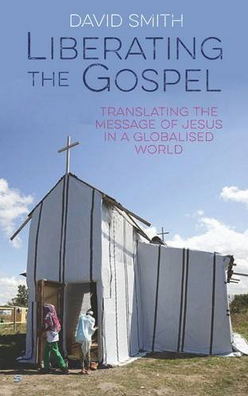Liberating the Gospel
Readable, inspiring and challenging book from David Smith on Christian mission
 Liberating the Gospel: Translating the Message of Jesus in a Globalised World
Liberating the Gospel: Translating the Message of Jesus in a Globalised World
By David Smith
Darton, Longman and Todd
ISBN: 9780232532333
Reviewed by Michael Manning
The front cover of David Smith's book Liberating the Gospel depicts worshippers at a church erected in the Calais refugee camp. Presumably this frail edifice has been destroyed in the recent 'closure' of the camp by the French authorities. It seems an apt warning about the powers of globalisation that Smith's book so eloquently explores.
Smith – currently an Honorary Lecturer at the University of Aberdeen and a man with a vast experience of global mission – advocates 'deep listening' to scripture, by which he means paying sustained attention to the cultural, economic, political and social dynamic of the context in which scripture was written. The very term 'gospel' is not univocal and should not be taken for granted.
Jesus' own words warn against 'the probability that his radical message of the coming kingdom of God will be compromised, its demands softened in a process of accommodation to the spirit of the world.'
Smith is interested in what lies between 'the cradle and the cross' of Jesus. He wonders why the poverty of Jesus remains so often sidelined by the Western church, as he traces the invasive, exploitative economic, architectural and military activity of the occupying Roman forces in Galilee. In Jesus' articulation of a common life that disturbs the status quo, he puts himself in opposition to the gospel of Rome and her empire. Following Jesus 'must be validated by a life that reflects the holiness, compassion and dedication to God's will' that we see in Jesus.
Smith explores the urban aspect of early Christianity in and shows how mission for Paul was about sharing life with the poor. His exhortations in Romans are read with new eyes when we realise that they are addressed to de-valued, dehumanised people subsisting in large tenement blocks. Paul wants their identity to be formed in love by the gospel, not by their surrounding empire and her ideology. The poverty and weakness of Jesus redefines 'omnipotence' and divine power. 'This is not just a truth to be believed, but a way of life to be imitated.'
The gospel of Jesus was in direct opposition to the gospel of Caesar. Paul wanted churches to be counter-cultural without being anti-cultural and it was the communal praxis of the church that was Paul's 'ecstatic joy' and the greatest threat to the Roman hierarchy.
Praxis and economics are central again in the treatment of Revelation. Faithfulness is seen in behaviour. 'The letters to the seven churches reveal communities struggling to remain faithful to the gospel, faced with...the enticing possibilities of compromise, advocated by those who sought to modify the demands of discipleship and so make possible both social acceptance and economic success in a pagan society.'
Revelation contains powerful new myths, symbols and images to counter imperial propaganda. In one of Smith's most penetrating sections of the book he explores the imaginal realm of Revelation, highlighting the holistic nature of worship, the vision of the New Jerusalem in the context of mass urbanisation and the fact that the book may only be understood 'from below': from those hungry and thirsty for justice. He delineates the West's and modernism's deep complicity in abusive power and hegemony that has raped creation and left millions impoverished. The suffering, beleaguered church of the poor has many parallels with the Global South today.
In the 21st century world of globalisation we need a bigger gospel than one focussed on individual salvation and private faith. Smith draws on Zygmunt Bauman's work on the wasted environment and wasted lives that the increasing commodification of existence has created. Bauman distinguishes between the global 'vagabonds' and the global 'tourists': both sets of people restless, uncertain and on the move. In the pathology of globalisation the rich also suffer in a 'liquid world' where nothing can be trusted.
Smith rejects Bauman's pessimism, however, and explores ways that the poor are never powerless to effect wider change in society. He draws on examples of faith in Communist countries in the twentieth century, and the abiding influence of African-American spirituality and global Pentecostalism. From the margins of a globalised world he discerns hope that we can analyse and overthrow our idols. For the contemporary Western church he has a strong challenge: can we forge solidarity with our brothers and sisters in the Global South? Can we repudiate our reliance on riches and materialism and our dependence on a fundamentally unjust and exploitative economic system? He is clear that we cannot serve two masters.
This book is readable, inspiring and challenging. Smith wears his great learning lightly and draws on a breadth of sources and disciplines that make his explorations rich and satisfying. I would have liked to seen more time spent working through some of the radical implications of his 'deep listening' to the gospel but I suppose that is the challenge handed to the church: what does it mean to bear witness in life and words to the liberating message of Jesus in this time and place? Smith's work is an invaluable aid to us all as we try to incarnate that together.
Michael Manning is a co-ordinator of Graih, a charity serving those who are homeless and in insecure accommodation on the Isle of Man. He lives with his family in a shared household and belongs to Broadway Baptist Church in Douglas
Baptist Times, 07/12/2016